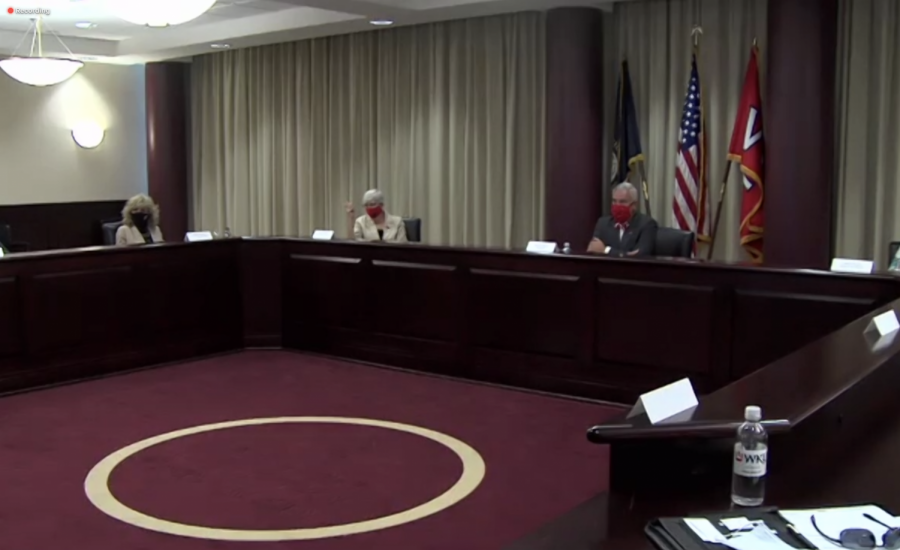Faculty and Staff get answers to lingering questions in open forum
August 3, 2020
With the fall semester closely approaching and questions from faculty and staff still unanswered, several members of the president’s cabinet gathered for an open forum Monday afternoon on Zoom to address those questions and to further discuss the WKU Big Red Restart plan.
President Timothy Caboni opened the forum with an introduction then proceeded to answer the questions that were submitted before the Zoom call. He said the goal of the Zoom call was to make sure faculty and staff have all the information they need before the start of classes, which begin on Aug. 24.
Many of the questions were focused on testing, contact tracing, and a response plan in case of positive COVID-19 cases. David Oliver, director of Environmental Health & Safety and Emergency Manager addressed the key elements of the plan for each topic, such as daily health checks and finalizing a policy that deals with protective measures such as face coverings and social distancing. More information will be announced later this week, according to Oliver.
Oliver announced that not only will testing be available to faculty, staff, and students, but the cost will be covered throughout the pandemic. A weekly-updated dashboard on the Healthy on the Hill website will include data about cases, demographics of those cases, and the amount of PCR testing done on campus.
Caboni addressed those who are concerned about why WKU has taken several measures during the pandemic. He said he is confident that with the amount of input from health care professionals, WKU has done everything they can do to make the campus as safe as possible.
“There is not a risk-free environment. There will be COVID cases on this campus and our job is to identify them, isolate them, and contact trace them as quickly as we can. That takes everybody. The entire community,” Caboni said.
Executive Vice President for Strategy, Operations, and Finance, Susan Howarth, confirmed that there will be no limitation to the amount of testing any individual chooses to ask for as well.
For students who live in out-of-state hotspots for COVID-19, Vice President for Enrollment and Student Experience, Ethan Logan, said that students should consider self-quarantining for 14 days before returning to campus.
“It is a good practice and a solid consideration for all students, especially if you travel outside of Bowling Green to come back to campus, to have a period of self-quarantine both for your benefit and the benefit of the community for when you return,” said Logan.
Students who live in a hotspot were contacted by WKU via email last week, Caboni said.
In the case of student workers, Logan encouraged them to come back to campus to not only help work in the offices but also to help facilitate public interaction.
Another question raised was about why WKU is not planning on testing students before they come back to campus. Caboni said that there are multiple reasons for this.
Caboni said that even though people may not test positive right away or receive a test that comes back negative, there are multiple ways that you can catch the virus.
“Number one, you may have other engagements after that test before you arrived on campus or even after you arrived on campus where you might contract the virus,” Caboni said.
Secondly, oftentimes in the early stages of the virus, there is a higher chance of a negative test result, according to Caboni.
“The experts suggested that testing everyone really doesn’t give you a sense of whether they actually have or don’t have the virus,” Caboni said.
Lastly, when a person feels that they have received an incorrect test back, people may gain a false sense of safety, Caboni said.
“It might mold our students to feel more confident and not follow all the guidelines we have in place,” Caboni said.
In relation to student behavior, Assistant Vice President for Student Life and Dean of Students Lynne Holland said the university has set forth guidance to help shape student behaviors to make the campus safe.
One example of this is the new Hilltopper Healthy Pledge, which uses language from the actual university creed and elaborates on what behaviors students are expected to engage in when on campus.
Secondly, a student COVID task force has been created from input from students on what the process should look like for normalizing certain behaviors for students, Holland said. Individuals within this task force will be influencers, help create a communication plan for certain behaviors, and look at the restart plan from a student’s perspective, and make changes.
During the open forum, questions varied from all topics including, sports, dining services, classes, and extracurricular events. Each administrator acknowledged the risks of coming back and they claimed that they are prepared to handle the possible problems that can occur.
Caboni said that he remains committed to WKU opening. WKU is the safest place to be despite the risks that are associated with the reopening of campus, Caboni said.
“I am confident in telling faculty, staff, and students that our environment here on campus is safer than just about anything here that you are going to find in the local community, but I also understand the control around staying at home and being able to isolate there,” Caboni said.
With hard work from the university, he believes that a community effort will also make WKU a safe place.
“We are going to work through this together,” Caboni said. “We worked really hard to create a space for our faculty, staff, and students to make this as safe as possible.”
During the semester, if students need help call (270-745-2019) or email c[email protected].
For those who could not join Monday’s forum, a recording of the forum will be posted tomorrow on the new WKU website.
The next open forum will be for students and families on Aug. 5 from 4 p.m.to 5 p.m.















